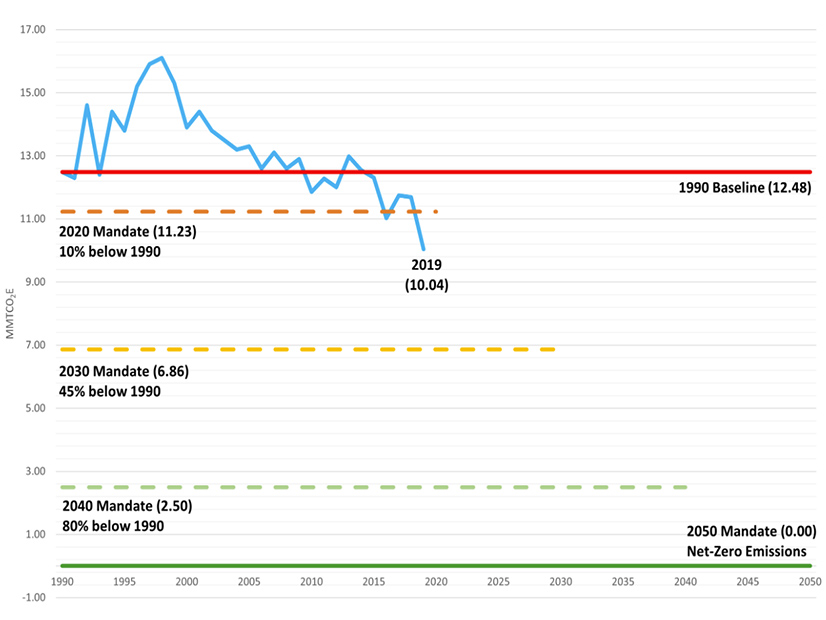Rhode Island is dedicating $25 million of American Rescue Plan Act funding to create a new heat pump incentive program, Gov. Dan McKee (D) announced last week.
Named Clean Heat Rhode Island, the program will expand heat pump incentives available from the state’s Office of Energy Resources (OER), which previously were focused only on households with oil or propane heating systems.
The new incentives “will make heat pump incentives available to a wider range of Rhode Islanders,” the OER wrote in a press release.
Rhode Island law mandates a 45% decrease in carbon emissions by 2030 compared to 1990 levels, and net-zero emissions by 2050.
“Residential and commercial heating is a major contributor to our state’s carbon emissions,” McKee said in his announcement. “My administration has been hard at work to develop a solution that makes energy-efficient electric heating accessible and affordable for everyone.”
Rhode Island’s residential and commercial heating sectors combined to make up about 28% of the state’s total emissions in 2019, with an additional 1.3% of emissions coming from the gas distribution network, according to the state’s emissions inventory. From 1990 to 2019, combined emissions from the residential and commercial heating sectors declined by about 14%, lagging the 19.6% decrease in total statewide emissions, according to the inventory.
The new incentive program will be broken up into three categories: a residential incentive for homes heated with fossil fuels, an additional residential incentive for low-income customers and a commercial incentive meant for small businesses, nonprofits and public buildings.
The standard residential incentive includes $1,000 per ton (12,000 BTU) of capacity to switch to efficient air source heat pumps and $1,250 per ton for ground source heat pumps. The state also is offering a $750-per-ton new building incentive for air and ground source heat pumps. Both incentives are capped at $10,000 per household.
For income-eligible customers, the incentive will cover the entire cost of the upgrade, but it extends only to customers with oil and propane heating systems.
According to the state, heat pumps for Rhode Island homes typically require two to three tons of capacity. A 2020 study commissioned by National Grid found that converting a single-family Rhode Island home to a ductless mini-split heat pump would have an average installed cost of $15,600.
The commercial incentive, which includes $2,500 per ton for air source heat pumps and $4,500 per ton for ground source heat pumps, is extended to nonprofits as well as small-to-medium businesses with less than $30 million in gross annual revenue.
Rhode Island Energy, the state’s investor-owned utility company, also offers up to $350 per ton to residential customers switching to electric heat pumps from propane, oil or natural gas heating systems.
The new incentive program comes as the state continues to grapple with how to cost-effectively decarbonize its heating sector and natural gas network.
Rhode Island’s Public Utilities Commission is in the middle of a multiyear investigation into the future of the state’s gas network and how to align the network with the state’s statutory climate goals (Docket No. 22-01-NG). (See Rhode Island PUC Grapples with Future of Gas.)
The PUC assembled a stakeholder committee in March of this year — with representation from a diverse range of companies and organizations, from Enbridge to the Sierra Club — to determine the scope of the investigation’s technical analysis.
The stakeholder committee is expected to finalize a list of decarbonization scenarios for the state’s gas network in September. In the coming weeks, the state likely will announce the members of a technical working group, who will work with consulting firm Energy + Environmental Economics (E3) to develop the granular assumptions for the technical analysis.
In August, E3 circulated a list of draft decarbonization scenarios that varied in levels of reliance on heating electrification, the existing gas system and alternative fuels like hydrogen and biomethane. The draft options ranged from a “High Electrification” scenario, which assumes the eventual decommissioning of the gas system, to a “Continued Use of Gas” scenario, which assumes a significant role for alternative fuels.




